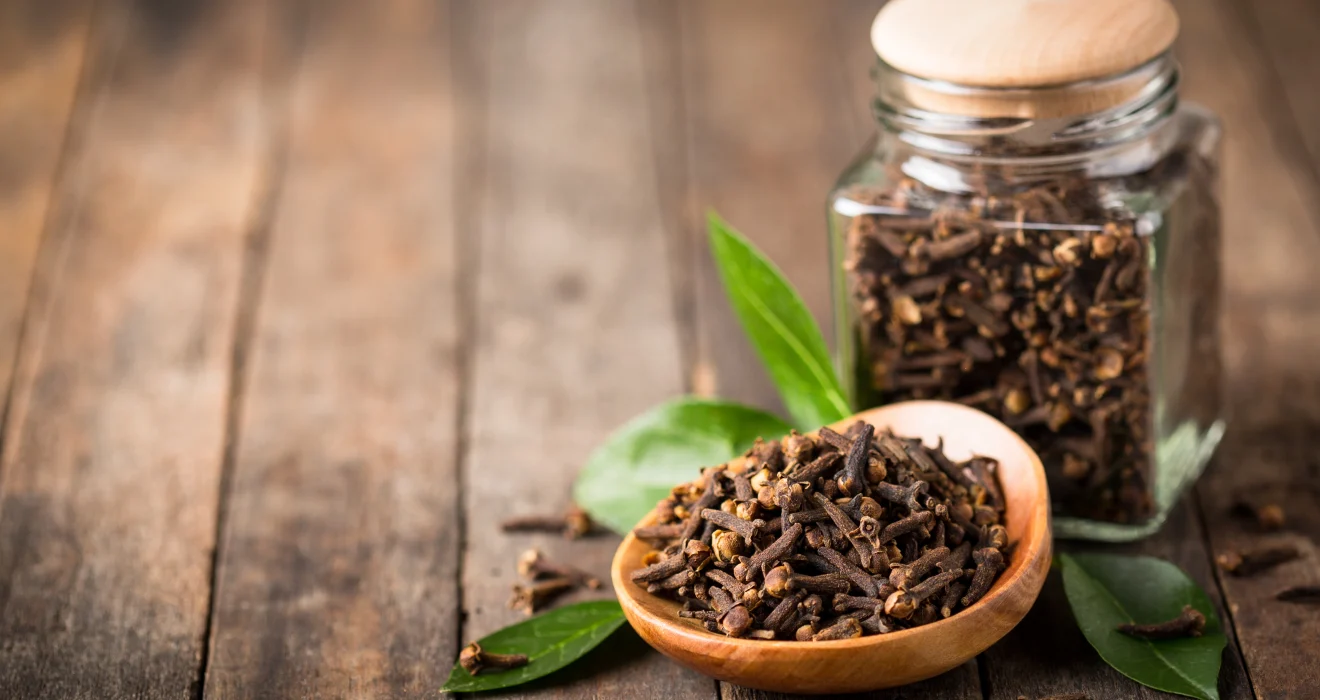Clove (Laung), Benefits, Side-effects and More
Cloves are the dried flower buds of the clove tree (Syzygium aromaticum), native to Indonesia’s Maluku Islands. They are known for their strong, aromatic flavor and are widely used as a spice in various cuisines, as well as in traditional medicine for their analgesic and antiseptic properties. Cloves can be used whole or ground in cooking and are a key ingredient in many spice blends.
Table of Contents
ToggleHealth Benefits of Clove
Full of nutrients:-
One tablespoon (6.6 grams) of ground cloves contains the following nutrients and their approximate values:
-
Vitamins:
- Vitamin K: 9 micrograms (11% of the Daily Value)
- Vitamin C: 1.6 milligrams (2% of the Daily Value)
- Vitamin A: 12 IU (0% of the Daily Value)
- Folate: 2 micrograms (0.5% of the Daily Value)
- Niacin (Vitamin B3): 0.3 milligrams (2% of the Daily Value)
- Thiamin (Vitamin B1): 0.01 milligrams (1% of the Daily Value)
- Riboflavin (Vitamin B2): 0.02 milligrams (1% of the Daily Value)
-
Minerals:
- Manganese: 1.3 milligrams (65% of the Daily Value)
- Calcium: 44 milligrams (4% of the Daily Value)
- Magnesium: 10 milligrams (2% of the Daily Value)
- Iron: 1.2 milligrams (7% of the Daily Value)
- Phosphorus: 8 milligrams (1% of the Daily Value)
- Potassium: 60 milligrams (2% of the Daily Value)
- Zinc: 0.2 milligrams (1% of the Daily Value)
-
Other Nutrients:
- Dietary fiber: 2.3 grams (9% of the Daily Value)
- Omega-3 fatty acids: Trace amounts
- Omega-6 fatty acids: Trace amounts
-
Bioactive Compounds:
- Eugenol: Approximately 1.2 milligrams per gram of cloves (varies with clove quality)
Antioxidant Properties
Cloves are rich in antioxidants such as flavonoids and phenolic compounds, which play a crucial role in neutralizing free radicals in the body. Free radicals are unstable molecules that can damage cells and contribute to aging and various diseases. By scavenging these free radicals, cloves help reduce oxidative stress and inflammation, thereby potentially lowering the risk of chronic conditions like heart disease, diabetes, and certain cancers. Regular consumption of cloves or their extracts may contribute to overall cellular health and longevity.
Anti-Inflammatory Effects
One of the primary bioactive compounds in cloves is eugenol, which exhibits strong anti-inflammatory properties. Inflammation is the body’s natural response to injury or infection, but chronic inflammation can lead to various health problems, including arthritis. Cloves have been traditionally used to alleviate inflammatory symptoms, such as joint pain and swelling associated with arthritis. The anti-inflammatory effects of cloves make them not only a flavorful spice but also a therapeutic agent for managing inflammatory conditions.
Antimicrobial Action
Cloves possess potent antimicrobial properties, primarily attributed to compounds like eugenol and eugenyl acetate. These substances have been shown to inhibit the growth of bacteria and fungi. In oral health, cloves are commonly used for their ability to combat oral pathogens, reduce plaque formation, and freshen breath. Chewing on cloves or using clove oil as a mouth rinse may help prevent dental infections, gum disease, and other oral health issues. Beyond oral care, cloves’ antimicrobial properties extend to potential applications in food preservation and topical treatments for skin infections.
Digestive Health Support
Cloves have a long history of use in traditional medicine for improving digestive function. They stimulate the secretion of digestive enzymes, which enhances nutrient absorption and aids in the breakdown of food. Cloves are also known to have carminative properties, meaning they can reduce gas and bloating by relaxing the smooth muscle lining of the digestive tract. This makes cloves beneficial for individuals suffering from indigestion, flatulence, or abdominal discomfort after meals. Including cloves in your diet or consuming clove tea can support overall digestive health and promote gastrointestinal comfort.
Blood Sugar Regulation
Emerging research suggests that cloves may help regulate blood sugar levels and improve insulin sensitivity. Compounds found in cloves, such as eugenol and flavonoids, appear to enhance insulin action and glucose metabolism in the body. By promoting better blood sugar control, cloves may offer benefits to individuals with diabetes or those at risk of developing the disease. Incorporating cloves into meals or consuming clove extracts under medical supervision could potentially contribute to better glycemic management and reduce the risk of diabetic complications over time.
Respiratory Health
Cloves have been traditionally used to alleviate respiratory ailments such as coughs, colds, and asthma. The expectorant properties of cloves help thin mucus and phlegm in the respiratory tract, making it easier to expel and relieving congestion. Clove oil vapors or steam inhalation with cloves can provide respiratory relief and soothe irritated airways. Additionally, cloves’ antimicrobial properties may help combat respiratory infections caused by bacteria or viruses. Including cloves in herbal teas or using clove-infused remedies during respiratory illness can support respiratory health and promote faster recovery.
Side-effects of Clove
While cloves are generally safe when used in moderate amounts as a spice or in herbal remedies, excessive consumption or improper use may lead to certain side effects for some individuals. Here are potential side effects associated with cloves:
Allergic Reactions:
Some people may be allergic to cloves, experiencing symptoms such as itching, rash, swelling, or difficulty breathing. Individuals with known allergies to other spices or plants in the same family (such as mugwort or birch) may be more prone to clove allergies.
Skin Irritation:
Clove oil, when applied directly to the skin or mucous membranes, can cause irritation or burning sensations. It’s important to dilute clove oil properly before topical application and perform a patch test on a small area of skin to check for sensitivity.
Gastrointestinal Issues:
Consuming large amounts of cloves or clove oil may irritate the digestive tract, leading to symptoms like nausea, vomiting, or diarrhea. Cloves have carminative properties that can help alleviate gas and bloating for most people, but excessive consumption may have the opposite effect.
Blood Thinning:
Cloves contain eugenol, which can act as a blood thinner. While this property can be beneficial in some cases for improving circulation, individuals taking blood-thinning medications (anticoagulants) should use cloves cautiously to avoid excessive bleeding risk.
Drug Interactions:
Cloves may interact with certain medications, including blood-thinning drugs, medications for diabetes, and drugs metabolized by the liver. It’s advisable to consult a healthcare provider before using cloves medicinally, especially if you have existing health conditions or are taking medications.
Oral Health Concerns:
Prolonged or excessive use of clove oil in the mouth may cause mucous membrane irritation, especially if not properly diluted. Swallowing concentrated clove oil can also lead to nausea, vomiting, or other gastrointestinal discomfort.
How to use clove properly to obtain health benefits?
To harness the health benefits of cloves safely and effectively, here are some recommended ways to use them:
As a Spice in Cooking:
Incorporate whole cloves or ground cloves into your cooking and baking. They add a warm, spicy flavor to both savory dishes (like stews, curries, and marinades) and sweet treats (such as desserts and spiced drinks). This culinary use not only enhances flavor but also allows you to benefit from cloves’ natural antioxidants and other nutrients.
Clove Tea:
Make clove tea by steeping a few whole cloves or 1/4 to 1/2 teaspoon of ground cloves in hot water for 5-10 minutes. This tea can be consumed plain or with a dash of honey and lemon for added flavor. Clove tea is commonly used to soothe digestive discomfort, alleviate respiratory congestion, and support overall immune health.
Topical Applications:
Dilute clove essential oil in a carrier oil (such as coconut oil or olive oil) before applying it topically. This diluted oil can be used for massage to relieve muscle pain or joint inflammation. Ensure proper dilution (usually 1-2 drops of clove oil per teaspoon of carrier oil) to avoid skin irritation.
Oral Health:
Clove oil is known for its oral health benefits. You can use it as a mouth rinse by adding a few drops of clove oil to warm water and swishing it around your mouth for a minute or two before spitting it out. This can help freshen breath, reduce oral bacteria, and alleviate toothache temporarily. Avoid swallowing the mouth rinse.
Steam Inhalation:
Add a few drops of clove essential oil to hot water and inhale the steam to relieve respiratory congestion. Cover your head with a towel to create a tent over the bowl and inhale deeply for several minutes. This method can help clear nasal passages and soothe coughs.
Herbal Remedies:
Clove can be combined with other herbs in herbal remedies. For example, it’s often paired with ginger and cinnamon for teas or infused into oils for massage blends. Follow recommended dosages and preparation methods when using clove in combination with other herbs.
Conclusion
Cloves are not only a versatile spice that enhances the flavor of dishes but also a potent herbal remedy with significant health benefits. From antioxidant and anti-inflammatory properties to antimicrobial and digestive support, cloves offer a holistic approach to improving health. However, like any natural remedy, it’s crucial to use cloves in moderation and with awareness of potential side effects, especially for individuals with allergies or medical conditions. By understanding how to incorporate cloves safely into diet and health routines, individuals can enjoy their numerous benefits while promoting overall well-being.



